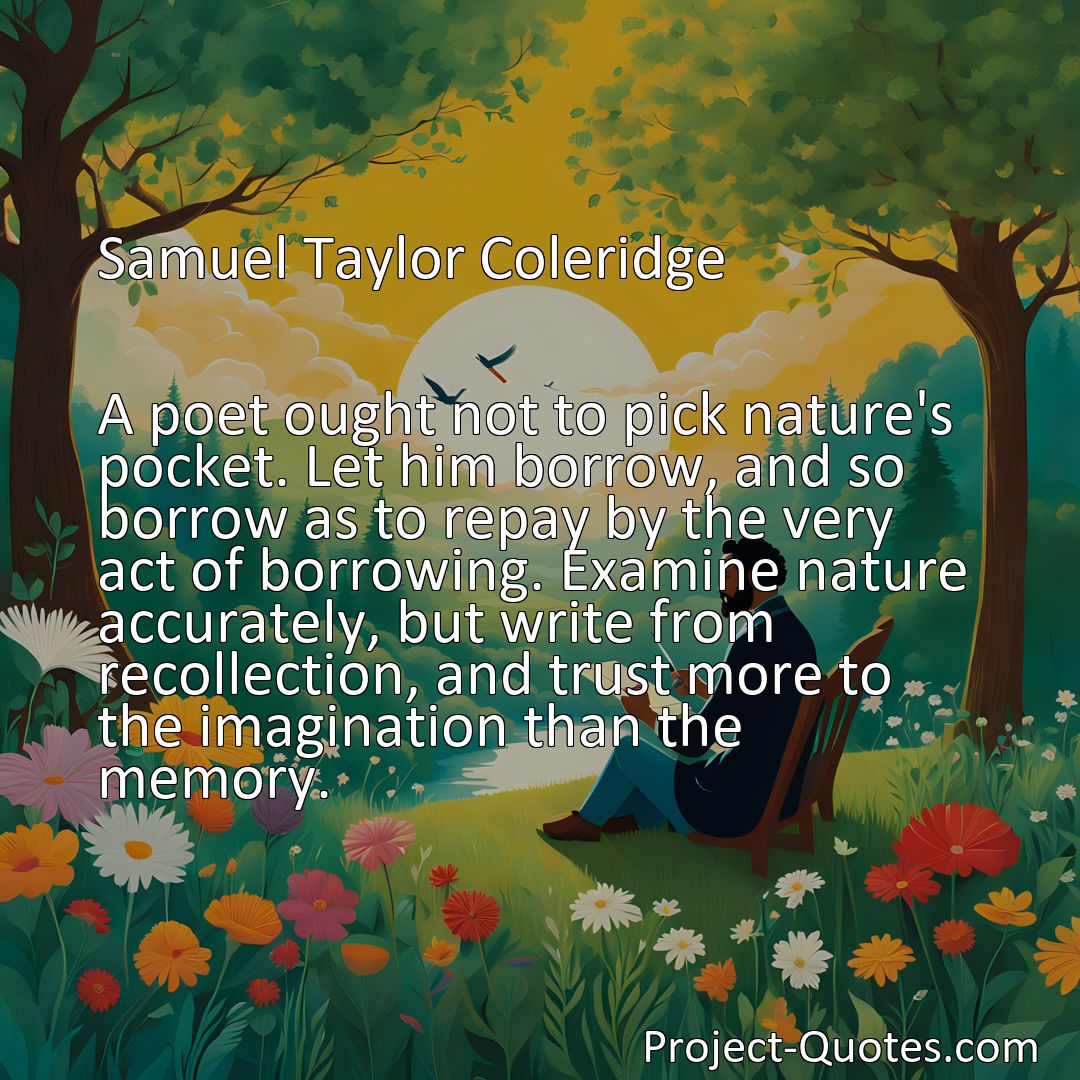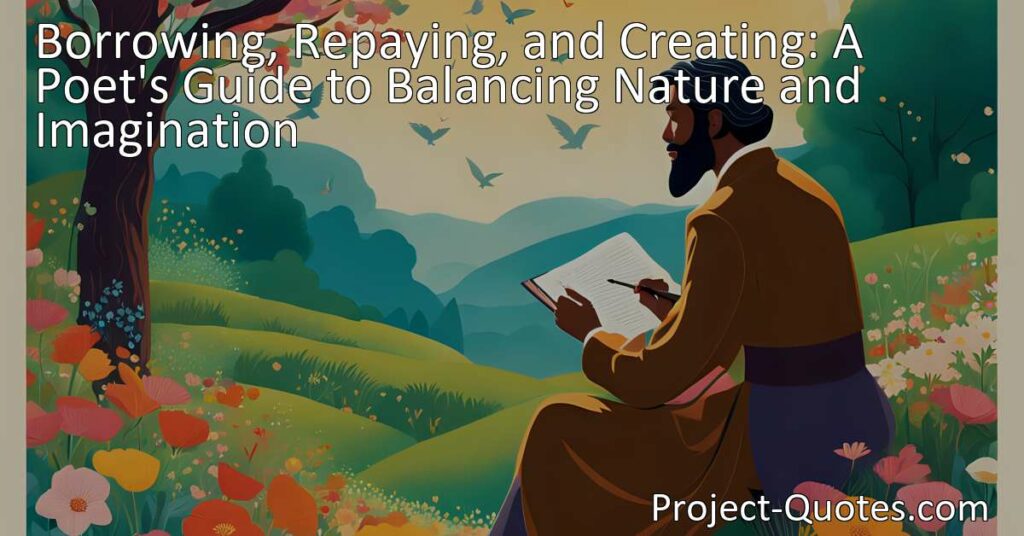A poet ought not to pick nature’s pocket. Let him borrow, and so borrow as to repay by the very act of borrowing. Examine nature accurately, but write from recollection, and trust more to the imagination than the memory.
Samuel Taylor Coleridge
The quote “A poet ought not to pick nature’s pocket. Let him borrow, and so borrow as to repay by the very act of borrowing” emphasizes the importance of creating nature-inspired poetry that goes beyond mere imitation. Poets are encouraged to closely observe nature, rely on their imagination, and write from recollection to create powerful and genuine poetry. By finding a balance between observation and interpretation, poets can pay tribute to the beauty of the natural world while showcasing their own unique perspectives and talents.
Table of Contents
- 1 A poet ought not to pick nature’s pocket. Let him borrow, and so borrow as to repay by the very act of borrowing. Examine nature accurately, but write from recollection, and trust more to the imagination than the memory.
- 2 Samuel Taylor Coleridge
- 3 Meaning of Quote – A poet ought not to pick nature’s pocket. Let him borrow, and so borrow as to repay by the very act of borrowing. Examine nature accurately, but write from recollection, and trust more to the imagination than the memory.
- 4 Freely Shareable Quote Image
- 5 Related
Meaning of Quote – A poet ought not to pick nature’s pocket. Let him borrow, and so borrow as to repay by the very act of borrowing. Examine nature accurately, but write from recollection, and trust more to the imagination than the memory.
As an aspiring poet, it is essential to understand the delicate balance between drawing inspiration from nature and merely imitating it. The quote, “A poet ought not to pick nature’s pocket. Let him borrow, and so borrow as to repay by the very act of borrowing,” encourages poets to be respectful borrowers from nature’s vast treasures. Rather than simply copying what is seen, poets are urged to closely observe nature, rely on their imagination, and write from recollection. These insightful words emphasize the significance of interpretation and personal connection in creating powerful and genuine poetry.
When a poet “picks nature’s pocket,” it implies a sense of theft or appropriation. It suggests a lack of originality or true artistic expression, as if the poet is merely copying what has already been created by nature. However, this quote encourages poets to approach nature with a sense of reverence, humility, and admiration. Instead of taking from nature without giving anything back, the poet is advised to borrow elements and ideas from nature while also bringing their unique perspectives and experiences to the table.
To truly understand this concept, let us explore the idea of borrowing and repaying in the realm of poetry. Imagine you are walking through a beautiful forest, surrounded by towering trees, vibrant flowers, and various creatures scurrying about. You feel a sense of awe and wonder, prompting you to take out your notebook and start writing a poem about the scene before you. But how can you ensure that you are not merely picking nature’s pocket?
Firstly, the quote suggests examining nature accurately. This means paying attention to the smallest details – the way the sunlight filters through the leaves, the delicate petals of a wildflower, or the sound of birdsong in the distance. By carefully observing and taking in these details, you can capture the essence of nature more authentically in your poetry. Whether it’s the vivid colors, the textures, or the sounds, these elements can be drawn upon when it comes time to write.
However, the quote also advises writers to trust more to the imagination than the memory. While it is essential to observe and remember nature’s beauty, relying solely on memory may limit the creative potential of your poetry. Memories can fade, details can become blurred, and the inspiration you initially felt may dissipate over time. Instead, the quote encourages poets to tap into their imagination, allowing it to infuse their work with fresh perspectives and unique interpretations of nature’s marvels.
Writing from recollection does not mean sacrificing accuracy or authenticity. It means transforming your memories into something more than a mere documentation of what you saw. It involves capturing the emotions, sensations, and impressions that the scene evoked within you. By drawing upon your recollections, you can lend a personal touch to your poetry, infusing it with your own experiences and emotions.
The act of borrowing from nature, as mentioned in the quote, also implies a sense of reciprocity. It suggests that the poet should aim to repay nature through their artistic endeavors. But how does one repay nature through poetry? The answer lies in using the act of borrowing as a means to create something new, something that embodies the spirit of what was borrowed while also offering a fresh perspective.
Consider this: you borrow the image of a majestic oak tree and its sprawling branches. In your poem, you describe how its arms outstretch like welcoming embraces, providing shelter to creatures both big and small. However, you also bring your own experiences and imagination to the depiction. You may describe how these branches whisper secrets to the wind or how they sway to an invisible rhythm, creating a mesmerizing dance. By infusing your imagination into the borrowed image, you repay nature by creating a poetic tribute that is both inspired by and adds something new to the original scene.
In essence, the quote encourages poets to find a harmonious balance between observation and interpretation. It reminds us that poetry is not just about accurately describing what we see but about capturing the essence of nature and infusing it with our unique perspective. By borrowing from nature in a respectful and imaginative way, we can create poetry that not only pays tribute to the beauty of the natural world but also showcases our talents and individuality as poets.
In conclusion, the quote “A poet ought not to pick nature’s pocket. Let him borrow, and so borrow as to repay by the very act of borrowing” serves as a poignant reminder for poets to approach nature with respect, imagination, and personal interpretation. By observing nature accurately, trusting in our imagination, and writing from recollection, we can create poetry that goes beyond mere imitation and becomes a genuine expression of our artistic vision. In this way, we can repay nature for its endless inspiration and contribute to the world of poetry with authenticity and creativity.
I hope this quote inspired image brings you hope and peace. Share it with someone who needs it today!


